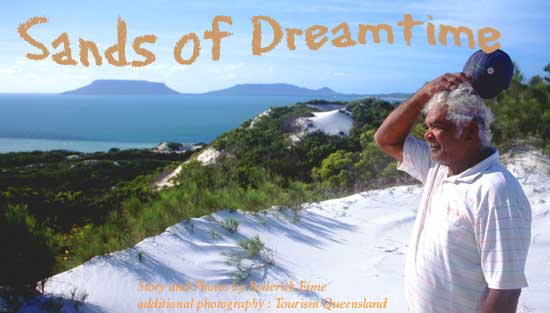 Indigenous
tourism is a fast growing niche segment in the Australian market. Some
contrived and some genuine, Rod Eime goes in search of green ants and
coloured sands and meets the authentic Gibson family of Hopevale north
of Cooktown.
Indigenous
tourism is a fast growing niche segment in the Australian market. Some
contrived and some genuine, Rod Eime goes in search of green ants and
coloured sands and meets the authentic Gibson family of Hopevale north
of Cooktown.
 "…
in reality they are far more happier than we Europeans; being wholy unacquainted
not only with the superfluous but the necessary conveniencies so much
sought after in Europe …"
"…
in reality they are far more happier than we Europeans; being wholy unacquainted
not only with the superfluous but the necessary conveniencies so much
sought after in Europe …"
So wrote Lieutenant James Cook in August 1770 in his journal of the New Holland natives after unprecedented interaction with them. Little did he know what impact British settlement would later have on these ancient people.
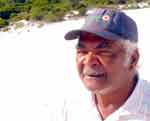 Les
Gibson, of the Guugu Yimithirr people, has an unusual insight into
the historic encounter with the great navigator. When Cook and his crew
spent 48 days on the banks of the Wahalumbaal River repairing Endeavour,
the Guugu Yimithirr supplied the stranded Englishmen with fresh
meat, fish and another staples.
Les
Gibson, of the Guugu Yimithirr people, has an unusual insight into
the historic encounter with the great navigator. When Cook and his crew
spent 48 days on the banks of the Wahalumbaal River repairing Endeavour,
the Guugu Yimithirr supplied the stranded Englishmen with fresh
meat, fish and another staples.
Les, comfortably ensconced in an old armchair on the verandah, reminds us that the ramshackle encampment, now Cooktown, became the first European settlement on the Australian continent. During this time his ancestors' language became the first to be written down. The word 'kangaroo' is derived from a Guugu Yimithirr word 'Gangurru'; whether it translated to 'furry marsupial' or 'what did you say?' is still a matter of some debate.
The Aboriginals had little use for the trinkets offered to them by Cook in exchange for supplies; nevertheless they took them out of respect and curiosity. Les knows where some of these items are stored even today, placed in reverence in a secret cave along with huge painted murals documenting Cook's stay in the district. A secret Les is determined to keep.
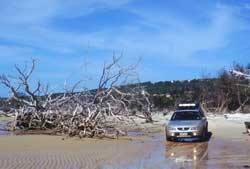 Today
the Guugu Yimithirr people refer to themselves as Bama and live at the
Hopevale Community, 46 kilometres north of Cooktown. They are a loose
amalgam of tribes from the local traditional lands and from as far north
as the tip of Cape York, formed when Lutheran missionaries relocated them
to be "sheltered" and "educated" in missions.
Today
the Guugu Yimithirr people refer to themselves as Bama and live at the
Hopevale Community, 46 kilometres north of Cooktown. They are a loose
amalgam of tribes from the local traditional lands and from as far north
as the tip of Cape York, formed when Lutheran missionaries relocated them
to be "sheltered" and "educated" in missions.
Their land returned by way of a Deed of Trust in 1986, then validated with a Native Title Determination in 1997, the Bama are a people now at one with their environment, returning via a strange and tragic irony to some approximation of how Cook found them in 1770. Now Les and his family are sharing their heritage and traditions with anyone who wants to come and see for themselves.
The family weekender, poetically dubbed Munbah (muddy creek), is the Hopevale version of a seaside retreat. Okay, so it's a beach shack. Overnight visitors can find a bunk in the communal "dorm" or pitch a tent in the yard. There's an outdoor bush toilet, a freshwater creek that serves as a washhouse, an open-air dining room, a BBQ area and a location on the most pristine, fine white sandy beach you can imagine.
During the day, Les let's you call the shots. Choose from spear-fishing, bush tucker foraging, traditional art classes with Les' wife Marie, excursions to the fabled coloured sands or a visit to an enormous sandpit that echoes spookily like distant cannon fire when you drop a rock at your feet. Local legend holds that the rocks are imbibed with a special quality, but Les smirks at this fable. Clearly the huge sandy amphitheatre possesses some unknown quality that creates supernatural reverberations deep within.
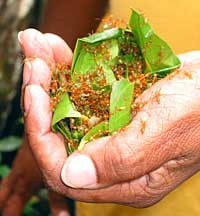 The
trek through the dense bush provides some interesting distractions along
the way. Hundreds of spiders the size of jam tin lids form huge "arachno
condos" of densely intertwined webs. I try not to imagine walking
into one. And as we brush past the many eucalyptus leaves along the narrow
path, hyperactive green ants hitchhike on our sleeves and forearms. Les
takes a look at the little interlopers scurrying inside my cuff and then
scours the nearby foliage. He spots what appears to be a swollen clump
of bright green leaves and deftly plucks it from the tree. It's literally
seething with the little blighters and in one deliberate, well-practiced
movement, Les crushes the whole mass with the palms of his weather-beaten
hands. Then, a lot more carefully, he opens his hands to reveal a mangled
mass of ants and leaves, a few mortally crippled insects still wriggling
in the pulp.
The
trek through the dense bush provides some interesting distractions along
the way. Hundreds of spiders the size of jam tin lids form huge "arachno
condos" of densely intertwined webs. I try not to imagine walking
into one. And as we brush past the many eucalyptus leaves along the narrow
path, hyperactive green ants hitchhike on our sleeves and forearms. Les
takes a look at the little interlopers scurrying inside my cuff and then
scours the nearby foliage. He spots what appears to be a swollen clump
of bright green leaves and deftly plucks it from the tree. It's literally
seething with the little blighters and in one deliberate, well-practiced
movement, Les crushes the whole mass with the palms of his weather-beaten
hands. Then, a lot more carefully, he opens his hands to reveal a mangled
mass of ants and leaves, a few mortally crippled insects still wriggling
in the pulp.
"Getta whiff of this," offers Les, first taking a sample inhalation himself, "this'll clear ya out!"
I take a carelessly large blast through my nose, immediately reeling at the strong vapour permeating my sinuses. Then I take another. Amazing! The acrid fumes have an immediate effect, clearing the passages and stimulating my sense of smell. I'm later told a story of a woman who hadn't smelt anything for years - until she tried the magic ants - and promptly burst into tears as the fragrant aromas of the blossoming bush immediately returned. Boiled, the ants also make a powerfully therapeutic cup of tea. Just imagine!
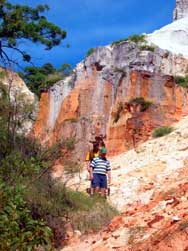 Later
that night under a bright star-strewn sky, we dine on T-bones cooked on
the outdoor "stove", washed down with a delicate red wine reserved
for the purpose. We were enjoying this indulgent feast when a Toyota "troopie"
noisily pulled up in the dining room.
Later
that night under a bright star-strewn sky, we dine on T-bones cooked on
the outdoor "stove", washed down with a delicate red wine reserved
for the purpose. We were enjoying this indulgent feast when a Toyota "troopie"
noisily pulled up in the dining room.
"Heeey!" exclaimed the new arrivals, doors slamming, "How areya Uncle Les!"
It's Les's boisterous nephew, Bruce, flanked by two burly cousins, Garry and Robert. Nervous city-slickers might be unnerved by this flamboyant entrance, but introductions are quickly made, Bruce flashing a broad, impeccable grin with each confident handshake. Apart from his outwardly carefree, gregarious nature, Bruce demonstrates a self-assured, determined character, reinforced with the physique of a front-rower. He immediately commands the motley gathering, casually batting quips about the table despite the unfamiliar faces.
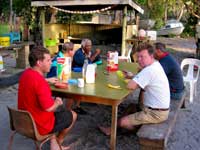 Bruce
stands in stark contrast to his shy uncle who looks on the lad with obvious
pride. He, along with Uncle Les, is a trustee for the Injinoo Land Trust
and a lucid mover-and-shaker with his sights set on state parliament.
He regales us for an hour or so on complex family and tribal history,
the persistent legacy of the Lutheran missionaries and the hopes he has
for his people in the relatively recently desegregated north of Queensland.
There's no lecturing, anger or vitriol, just a deliberate acknowledgement
of matters as they are - interspersed with both humorous and tragic anecdotes.
Bruce
stands in stark contrast to his shy uncle who looks on the lad with obvious
pride. He, along with Uncle Les, is a trustee for the Injinoo Land Trust
and a lucid mover-and-shaker with his sights set on state parliament.
He regales us for an hour or so on complex family and tribal history,
the persistent legacy of the Lutheran missionaries and the hopes he has
for his people in the relatively recently desegregated north of Queensland.
There's no lecturing, anger or vitriol, just a deliberate acknowledgement
of matters as they are - interspersed with both humorous and tragic anecdotes.
"Aboriginal people need to be reminded of where we've come from," says Bruce earnestly, "so many have lost their way because their connection with the land, their heritage, is gone."
 Mindful
of the bad press urban Aboriginals often get, Bruce dreams of bringing
small groups of vulnerable "koorie" youths up to Munbah for
some reintroduction in the traditional ways. He looks thoughtful for a
moment, pensively studying the imperfections in his enamelled plate, but
clearly engrossed in his plan of healing his people.
Mindful
of the bad press urban Aboriginals often get, Bruce dreams of bringing
small groups of vulnerable "koorie" youths up to Munbah for
some reintroduction in the traditional ways. He looks thoughtful for a
moment, pensively studying the imperfections in his enamelled plate, but
clearly engrossed in his plan of healing his people.
Just as quickly as he arrived, he's on his feet, thanking us for our brief hospitality and declaring to return at dawn if he pulls some Barra out of the nets he's off to set. Les farewells him warmly, leaving a lingering, proud glow in the old man. In Bruce he sees a future, a hope, for his people - someone with strength and determination enough to restore and secure the ancient traditions of the Guugu Yimithirr as well as maintain their rightful place in the global village.
 Fact
File
Fact
File
Les and Marie Gibson run "Munbah Cultural Tours" from the Hopevale Aboriginal Community, 50 kms north of Cooktown.
They cater to both day visitors and overnighters, offering insights and hands-on experience into:
- bush tucker and medicine
- traditional hunting techniques
- spear and woomera making
- aboriginal art and craft
 For
visitors without their own or hired 4WDs, Les will meet them at
Cooktown Airport for transfer to Munbah.
For
visitors without their own or hired 4WDs, Les will meet them at
Cooktown Airport for transfer to Munbah.
For reservations or more information:
Les
Gibson
Pleasant View
Cooktown Road
Hope Vale QLD 4871
Tel +61 7 40609173
Note: Alcohol restrictions apply in many North Queensland communities. Severe penalties apply for breaches. Please see: http://www.mcmc.qld.gov.au/community/restricted.php
The writer would like to thanks Mr Tony Walsh from Tourism Queensland for his valuable assistance in the production of this story.
|
All
material, unless otherwise noted, is copyright to the author and
may not be used, reproduced or mirrored without express consent
in writing. Permission is not specifically sought for linking, although
the author does appreciate notification.
|